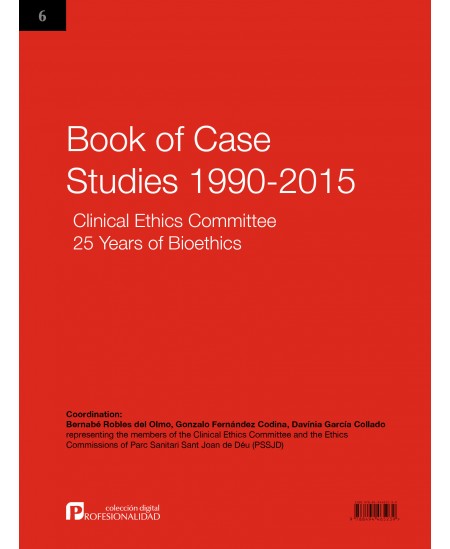 Ver más grande
Ver más grande Sólo online
Book of Case. Studies 1990-2015
Colección Digital Profesionalidad
The topics discussed in this second edition of the book of case studies are as diverse as the organisation itself: problems related to responsibility and the capacity of decision making, the application of involuntary treatments, confidentiality related to several health circumstances, risks to third parties, minors, conflicts related to pregnancy, vegetative states and representatives’ capacity, treatment refusal, therapeutic futility and limitation or ethical
aspects of the use of new technologies in the healthcare field. All in all, there are 77 cases compiled and organised during the work of this committee. In this second edition, 22 "historical" cases of mental health have been added, all of which have enough documentation recorded for their publication. These cases consist of situations discussed in the Clinical Ethics Committee (CEC) prior to its refoundation in March 2011 when the General Hospital of Sant Boi de Llobregat and the Mental Health Services were incorporated into the Health Park. The cases are explained with a similar methodology, which is simplified when the matters are less complex. The six reflections published in the first edition have been completed with four new specific reflections that treat different questions: chronicity, gamete donation, informed consent, ethical use of clinical images, treatment refusal and refusal in situations of serious vulnerability, therapeutic limitations, confidentiality and subjective annotations of the professionals, perinatal death and requests of caesarean sections "on demand".
As already stated in the first publication, these cases do not represent the whole of the work done by the CEC at the Health Park. The teaching activities, the generation of protocols and Recommendations for the Services, the organisation of the annual conference at the Health Park, the interventions during other congresses and the membership in other suprainstitutional organs and platforms related to ethical reflection of many of the CEC
members are other equally important tasks. The CEC tries to respond to this multiplicity of goals with a multilevel organisation model as complex as the institution itself. The sectorial commissions of Adult Mental Health, General Hospital, Intellectual Disability, Sociomedical Care and Child and Adolescent Mental Health ensure close collaboration with the professionals, key to the important demand for reflection on case studies that can be
observed at the moment.
The analysis of case studies is a key question for the paradigm shift that ethical reflection can contribute to the organisations in charge of the cure of patients in a situation of vulnerability. In fact, while the scientific knowledge refers to universal categories (such as "intellectual disability", "dementia", "chronic vegetative state") which, as common norms, are certain and demonstrable, the understanding of particular cases is based on probability
rather than on certainty. That’s why when analysing case studies we don’t pretend to arrive at definitive decisions but at reasonable or prudent decisions. This is the essence of ethical knowledge and of the methodology known as deliberation.
According to that and in order to diminish the uncertainty of particular cases as much as possible, it is necessary to weigh up the main factors that are involved adequately; that is, the facts, principles and values at play and the consequences of each of the suggested approaches.
The deliberation model is the centre of ethics based on applied responsibility and the analysis of complex situations, or value conflicts in which the particular case might be the exception to the rule due to its specific circumstances. All these aspects need to be analysed seeking consensus based on a multidisciplinary perspective and open to moral pluralism, both signs of the postmodern times our society is going through.
Finally a special thanks to the effort made by Gonzalo Fernández, Davinia García and Bernabé Robles. Without them, and this is not just a saying, the publication would not have been possible.
Characteristics of the book:
- Online download
- Available in pdf and epub format

